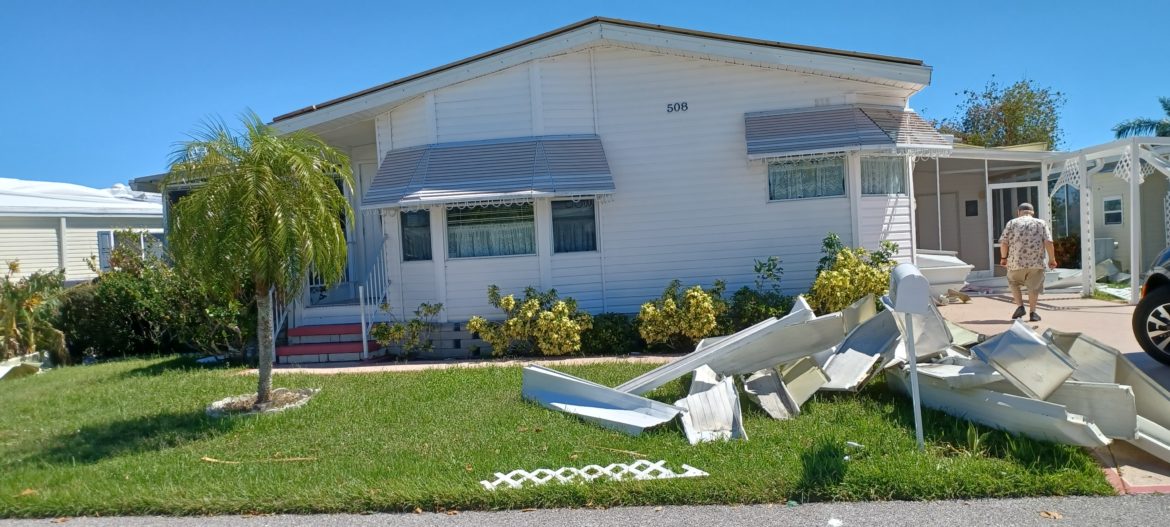Adolphe Bernotas is a retired Associated Press reporter. He and his wife Marguerite split their time between Florida and Concord, N.H. They have many New Hampshire friends rooting for them, including all of us at InDepthNH.org
By ADOLPHE BERNOTAS
Now that the roof is covered with the familiar blue tarp, we can sleep in our home undisturbed by indoor rain.
Still hoping for power and water (electric utility says we will be powerless at least another six days), which means charging phones in the plugin hybrid car (which itself gets charged at the public library) and standing in line for ice and water.
Learn interesting stuff during a disaster. For instance, boxes labeled “Jesus Food,” high-protein grains, when boiled produce pretty tasty vittles.
State cops keep the often miles-long lines of cars in orderly flow through gas stations. About half the stations are piles of aluminum rubble and of those that survived few are dispensing fuel. Drivers line up the night before hoping a tanker truck will arrive with fuel in the morning.
In our devastated city, a small percentage of supermarkets is open. By luck I scored several bags of ice, the last in the store that morning. Some shoppers offered to buy it at double or triple price.
We will be gathering our Hurricane Ian getaway kit from the sanctuary of a distant relative’s nearby house and returning to our home in Harbor Isles, a 600-house community of 55-plus people. I have begun calling Harbor Isles — Harbor Piles. The cliche of disaster serendipity applies — some houses destroyed, others unscathed.
Also unscathed, to our delight, are our “babies,” recumbent trikes stored in the shed.
We have calls in to contractors to fix the roof and build us a replacement carport; we have begun filing insurance claims.
The 48 hours of the blast were horrible. Ugly, frightening noises crashing against the walls of the house and its steel hurricane shutters. The almost-human, evil, angry screams, like barbaric hordes trying to penetrate our sanctum to destroy our lives.
Neighbors who have lived through such destruction compare Ian to the worst — Charlie and Andrew.
I had said to Marguerite to prepare to have her heart broken. What I dreaded most that if the house was totaled, I wouldn’t have it in us to rebuild. No need for that. We will fix the damage.
Frustrating us, especially me as a news junkie, was lack of information for far too long. No TV, no internet, nothing. Our battery-powered radio would yield religious talk shows, regular talk shows spreading nonsense and static.
As internet and radio reception improved useful information broke through — which roads were passable, gas stations with fuel, open supermarkets, pharmacies, where to find groups dispensing meals, how to reach insurance companies, FEMA.
Now we add to our must-have shopping list large bags for storm debris as the cleanup begins.
At night, I have been reading a memoir of a Lithuanian man of letters who survived the Soviet gulags.
I read it because his story of living through political disaster and deprivation not only of freedom but food mirrors my family’s experiences.
First, the Soviets raped Lithuania in 1940, (I was born under a Soviet birth certificate), then came the Nazis and exterminated the Jews with help from collaborators, then the Soviets returned and we fled into Germany, which was still at war with the Allies.
To me, a hurricane is kinder than the Soviet and Nazi occupations that drove my family out of its native land.
An AP colleague tells me now that I have been a war refugee, I can boast of a new experience — that of “climate refugee” for the few days I didn’t know whether my wife and I would be homeless.





